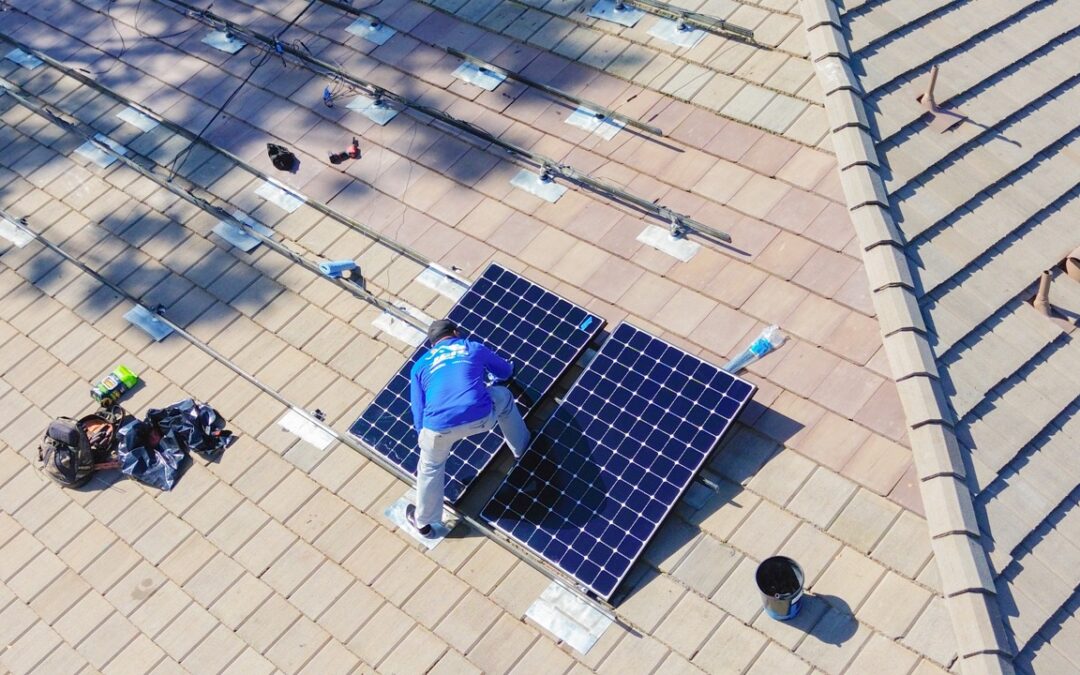At JCIS roofing, we’ve assisted hundreds of residents in our local area as they’ve transitioned to solar-ready roofing — whether that is through upgrades, repairs, or new installations. In this post we’ll review the best types of roofing material for solar panel installations and how to maximize your investment in renewable energy.
Why The Type of Roof You Have Matters for Solar Panels
Before you wade through the materials, it’s important to grasp why your type of roofing is a major factor in solar performance:
- Installation Compatibility: Materials are similar to some materials that anchor solar panels without damaging them.
Durability: Your panels may have a 25–30-year lifespan. You’re looking for a roof that can take you the distance and not have to be fully replaced halfway through.
Weight Support: The weight of a solar array may not be equally supported by all materials.
Efficiency: Your roof’s surface texture and angle can affect how much sunlight your panels absorb.
So let’s see how the top roofing materials compare for solar.
Asphalt Shingles — The Most Popular (and Most Compatible)
Pros:
Ubiquitous and economical
Solar contractors find it easy to deal with
Pairable with nearly all solar mounting systems
Cons:
A 20–25 years lifespan might be less than your solar system
Vulnerable to damage in extreme heat or heavy storms
Asphalt shingles are, by far, the most popular roofing material in the U.S. — and for good reason. They’re inexpensive, simple to install and compatible with most solar mounting systems. For a lot of homeowners, this is the default option.
That said, if your roof is over 10–15 years old, it is usually a good idea to repave it before panel installation. You will save on labor costs in the long run and not have to remove the solar system to re-roof later.
Standing Seam Metal – The Solar Rock Star
Pros:
Long lifespan (40–70 years)
No roof penetrations necessary—panels clamp directly down to seams
The fire-resilient, energy-efficient solution
Cons:
Higher upfront cost
Less common, therefore fewer contractors do it
If you have long-term plans, standing seam metal roofing is tough to beat for solar integration. The seams of the panels let solar installers clamp the racking system directly onto the roof—no drilling necessary. That translates to less potential for leaks, less labor hours, and greater durability all-around.
Metal is also extremely reflective, so it helps keep your home cooler, creating energy savings that extend beyond the panels. If you’re in the business of building new or re-roofing for the long haul, this is a best-in-class option.
Concrete or Clay Tile – Common in San Diego, But Not So Simple
Pros:
Outstanding durability (50+ years)
Great for hot, dry climates
Beautiful and ubiquitous in California
Cons:
Delicate tiles can break during installation
Not attached without additional mounting systems and labor
Concrete and clay tile roofs are ubiquitous in Southern California. They’re gorgeous, hold up really well in the sun, and last forever. But they can be difficult to install with solar.
Because tiles are brittle, your solar installer may need to take off tiles and cover them with composite shingle “flashings” or mounting pads. This takes time and labor—and costs more.
But a skilled roofing contractor like JCIS Roofing can work alongside your solar team to make sure the job gets done, without doing any damage to your roof or cutting corners.
Flat Roofs – Good for Commercial, Challenging for Homes
Pros:
A: Great maintenance access B: Easiest access to work on
Panel Efficiency: Adjustable Tilt Angles
Commonly seen on commercial buildings
Cons:
Requires Ballast Mounting or Roof Penetrations
Drainage, roof condition are paramount
- Flat Roofs: These are popular for commercial installations and some contemporary homes The biggest advantage is that racking systems can be adjusted at just the right angle to receive sunlight. Regardless of how your building is oriented, continue to optimize your panel layout.
Flat roofs need to be carefully considered to prevent water collection and ensure the building is strong enough to support it. Ballast-mounted systems (which rely on weight rather than drilling) are common here, but they can be rough on older flat roofing membranes.
What You Should Consider First Before Installing Solar Panels
Before you sign off on your solar installation, JCIS Roofing suggests you double-check the following:
Roof Age: If there is less than 10 years of life left on your roof, replace it first.
Structural Integrity: Ensure your roof can support the extra weight of panels, racking, and wind uplift.
Weatherproofing: Poorly mounted panels can cause leaks: Always use professionals familiar with roofing as well as solar.
Permits and Codes: San Diego County has unique building codes for solar;JCIS makes sure everything meets local code.
Get Your Contractors in Sync: Your solar contractor and your roofing contractor should coordinate. That’s why numerous customers rely on JCIS to cover roofing prep and project supervision.
The Future: Let Your Roof Work With Your Solar, Not Against It
Solar is a lucrative investment, but will only pay off if your roof is fit to support it. Here at JCIS Roofing, we work with homeowners from all over San Diego to ensure they make informed decisions that protect their energy savings and the structural integrity of their homes.
If you simply need an inspection, or to upgrade your roof, or completely replace it in order to go solar, we can help! We’ll guide you through the best materials for your goals, your home style and your wallet — so you can enjoy clean energy with absolute confidence.
Ready to Make Your Roof Solar-Ready?
Contact JCIS Roofing today for a free consultation and find out what roofing solution is best for your solar installation. Call us at 760.481.8006 or visit jcisroofing.com to get started.

